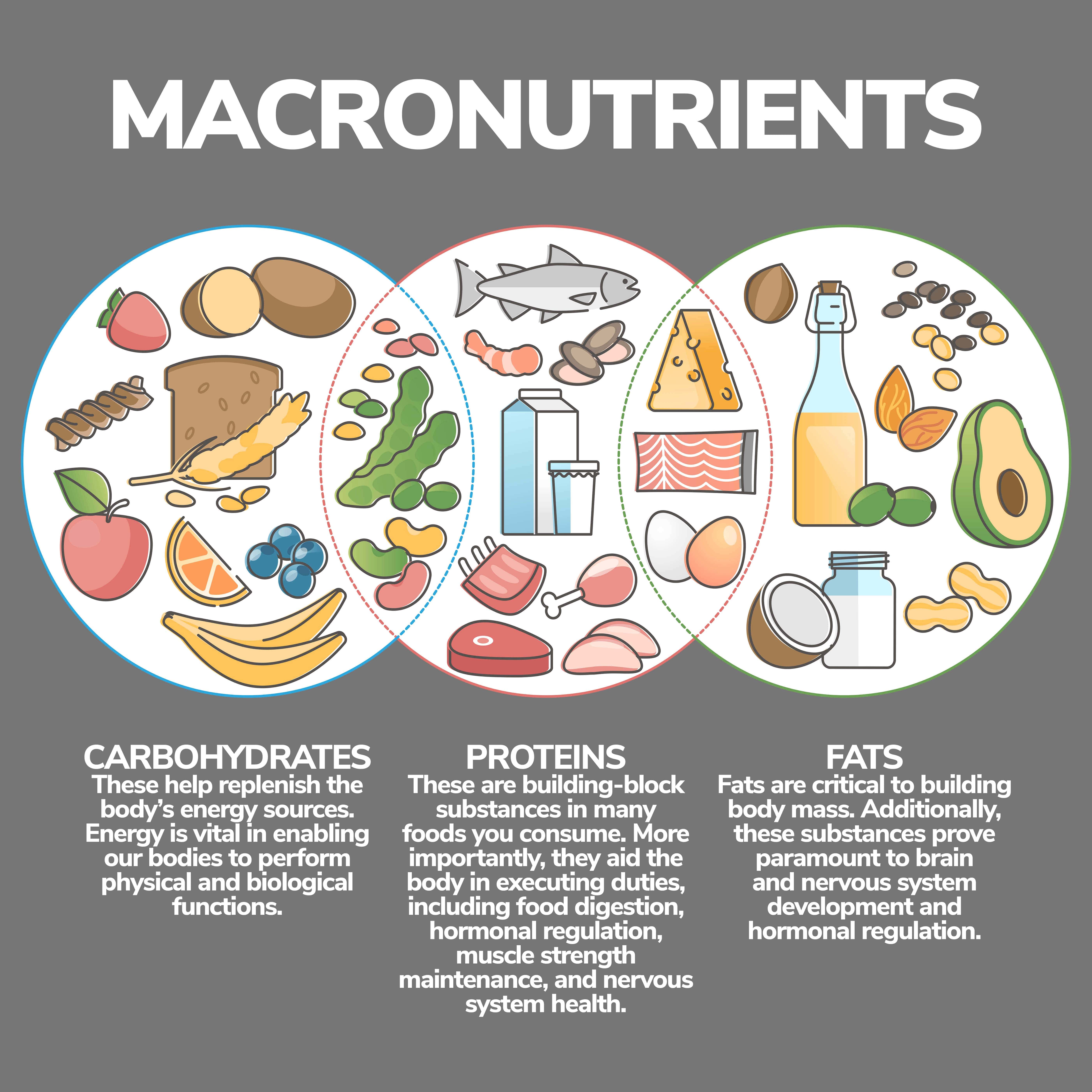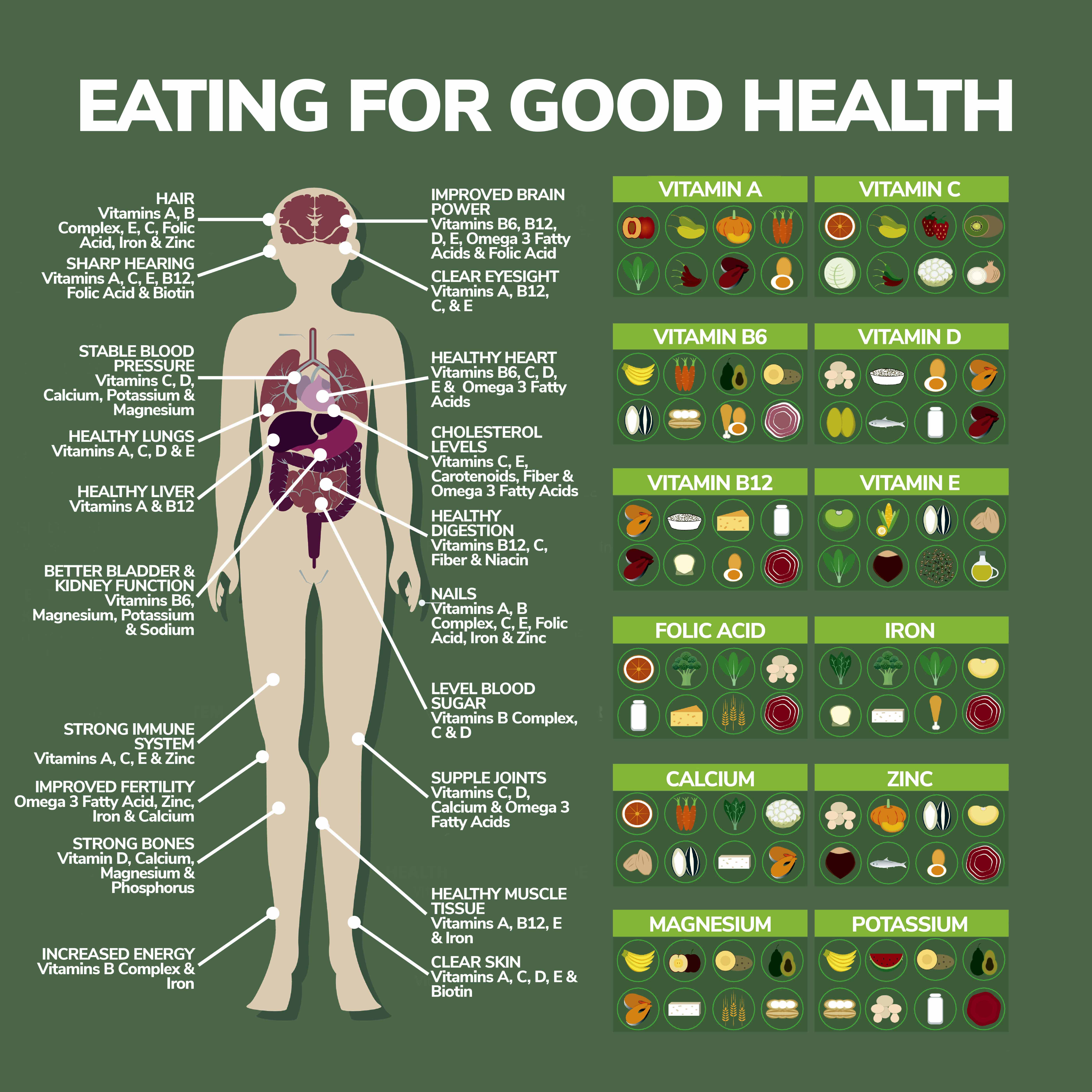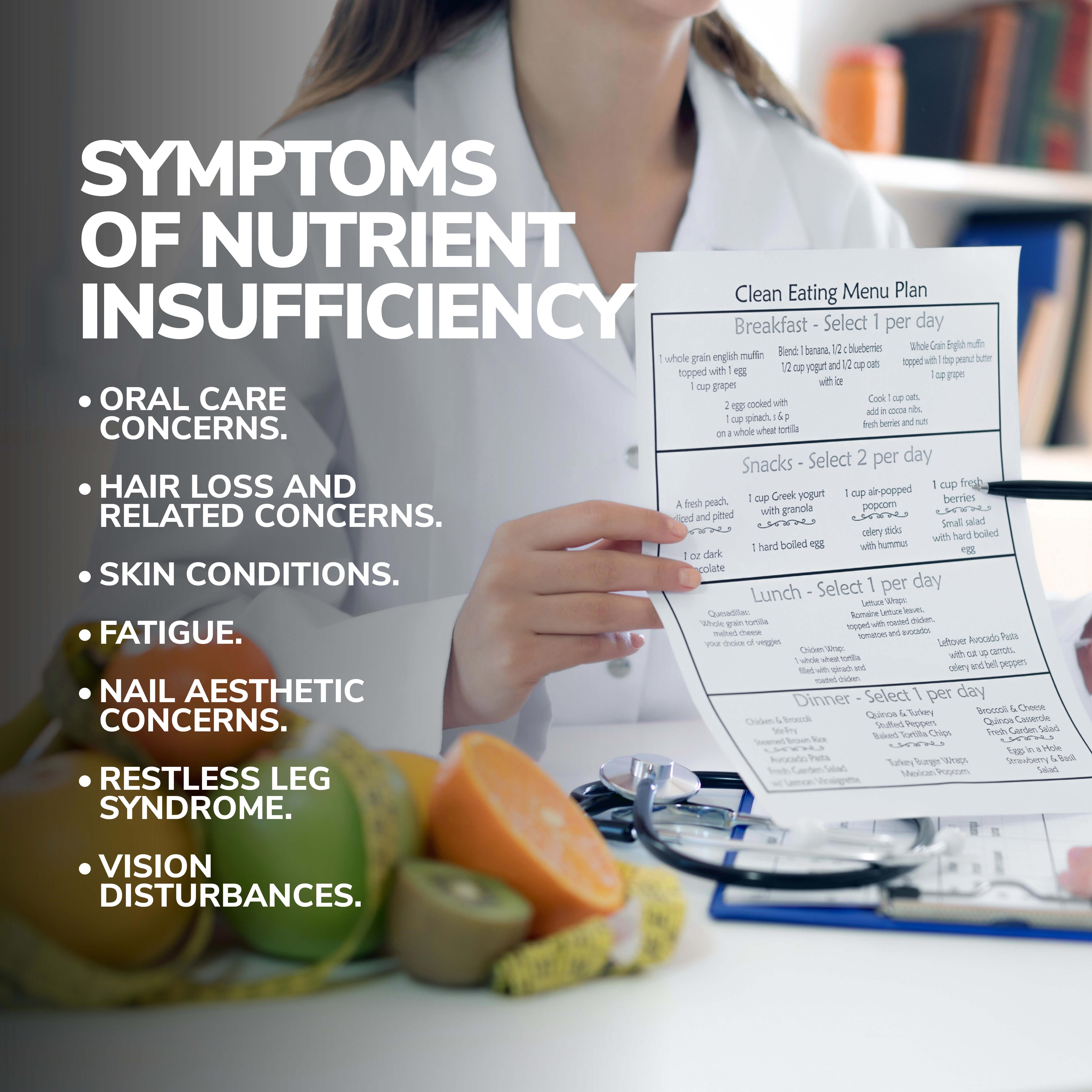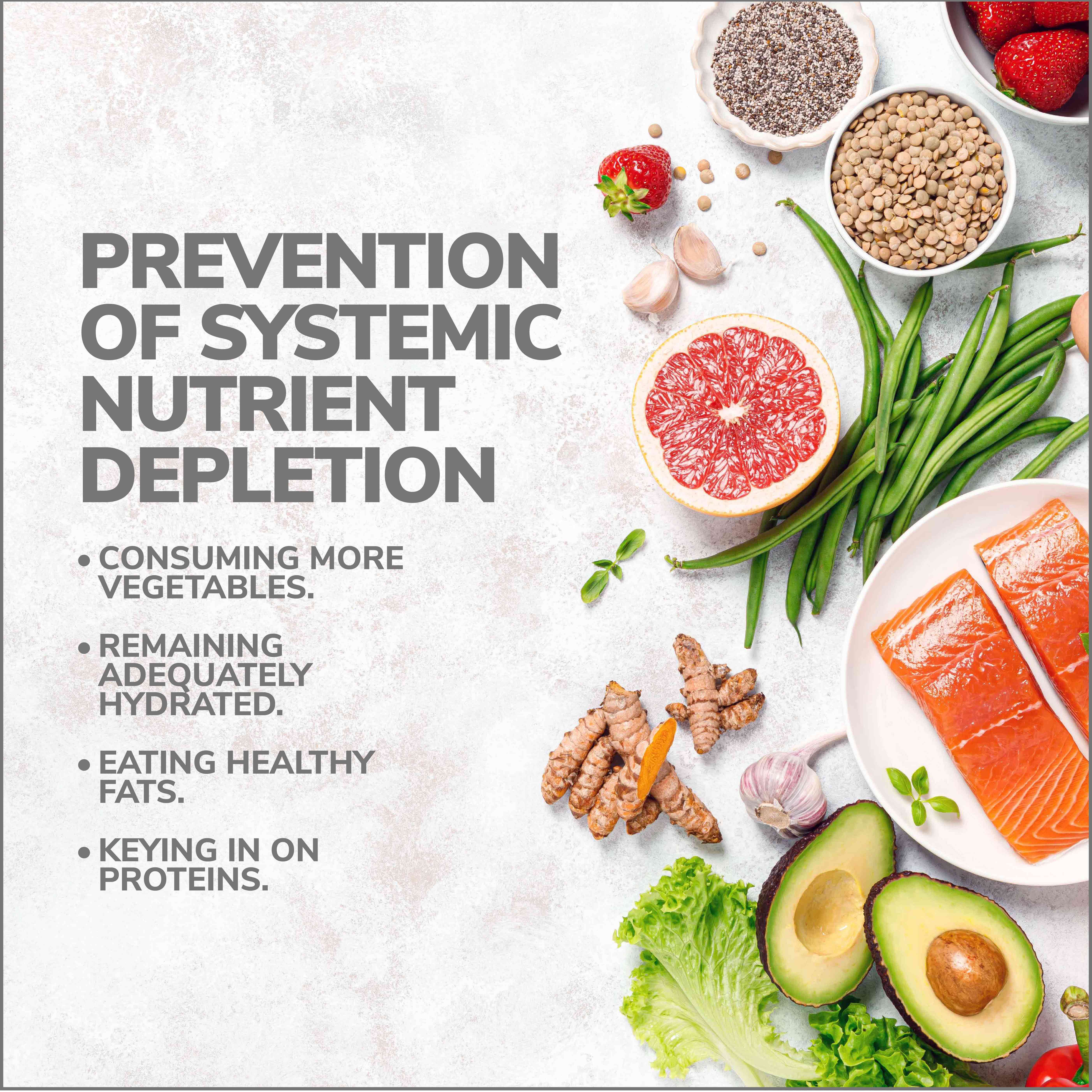
Systemic Nutrient Depletion
Many substances play a crucial role in ensuring the body’s cells, tissues, and organs perform their life-sustaining functions. Nutrients are one type of these substances. A condition known as systemic nutrient depletion can cause serious harm. The problem is identifiable and usually treatable.
Nutrient Overview
Nutrients are products your body requires to execute necessary functions such as growth, reproduction, and overall survival.
Nutrients are broken down into two basic categories: macronutrients and micronutrients.
Macronutrients are so called because your body requires significant quantities of them. The four primary macronutrients are protein, water, carbohydrates, and fats.
Macronutrients
- Proteins – These are building-block substances in many foods you consume. More importantly, they aid the body in executing duties, including food digestion, hormonal regulation, muscle strength maintenance, and nervous system health.
- Water – Water is vital to almost every bodily system. The liquid keeps the body adequately hydrated. Tissues not receiving enough water function poorly, if at all, increasing your chances for injury or illness.
- Carbohydrates – These help replenish the body’s energy sources. Energy is vital in enabling our bodies to perform physical and biological functions.
- Fats – Fats are critical to building body mass. Additionally, these substances prove paramount to brain and nervous system development and hormonal regulation.

Micronutrients
Your body requires much smaller amounts of these products to operate correctly. They are still critical to your overall well-being. Micronutrients are divided into two sub-categories: vitamins and minerals.
- Vitamins – 13 essential vitamins exist, including Vitamins A, C, D, E, K, and the Vitamin B complex comprised of chemicals such as riboflavin, thiamine, niacin, folate, B6, B12, biotin, and pantothenic acid. These products carry out many crucial activities, like strengthening your body’s immunity to disease and injury and providing tissues with the fuel they need to work effectively. Vitamins are contained in many of the foods you eat. They can also be found in vitamin supplements.
- Minerals – Like vitamins, minerals are vital to the body’s ability to execute countless roles. Minerals are further divided into two sub-categories: macrominerals like calcium, which your body requires in greater quantities, and trace minerals, including iron, which are needed in smaller amounts.
Causes Of Nutrient Deficiency
Nutrient depletion is influenced by various causes, such as:
- Age – As you grow older, your ability to chew and swallow can decline or become compromised for physical or biological reasons. Furthermore, your appetite may lessen with age. Regardless of the specific underlying age-related cause, decreased food consumption heightens your risk of systemic nutrient depletion.
- Illnesses – Various digestion-related problems lessen your gastrointestinal tract’s capacity to absorb nutrients. Common problematic sicknesses include:
- Celiac disease.
- Crohn’s disease.
- Ulcerative colitis.
- Cystic fibrosis.
- Other nutrient-threatening ailments include cancer and hormonal imbalance-related conditions like hyper- and hypothyroidism.
- Medications – Certain medications have been known to interfere with nutrient absorption. Common offenders include over-the-counter and prescription heartburn and acid reflux-suppressing compounds, diuretic drugs, blood pressure-lowering medications, and those prescribed to lessen Parkinson’s disease-related symptoms.
- Pregnancy – Nutrients consumed by expecting women serve both the needs of the soon-to-be mother and the growing baby. Pregnant women failing to take more significant quantities of crucial nutrients experience a greater chance of systemic nutrient depletion.

Symptoms Of Nutrient Insufficiency
In many instances, deficiencies in specific substances will produce individual signs. Several common symptoms suggest potential nutrient depletion, such as:
- Oral Care Concerns – An early sign of nutrient deficiency is oral care problems. Specific examples include the development of mouth ulcers, bleeding gums, cracks at the side of your lips, and chapped, cracked, or painful lips.
- Hair Loss And Related Concerns – A deficiency of several vital nutrients inhibits the body’s capacity to generate and maintain healthy hair. Hair loss not related to age may indicate nutrient depletion. Decreased systemic nutrient concentrations also cause related issues such as dandruff, scalp itching, and the growth of scaly patches along the scalp region.
- Skin Conditions – It is not uncommon for specific nutrient deficiencies to produce a condition known as keratosis pilaris. Symptoms of this disorder include the accumulation of tiny bumps or pimples on the skin of bodily regions such as the face, arms, buttocks, and thighs. Hair grows within these bumps.
- Fatigue – Nutrients help the body maintain and replenish energy levels. Diminished systemic concentrations often result in chronic and sometimes pronounced fatigue.
- Nail Aesthetic Concerns – Decreased quantities of certain nutrients have been known to cause brittle, splitting, and discolored fingers and toenails.
- Restless Leg Syndrome – This condition occurs when you experience uncontrolled leg movements and unusual feelings and sensations in your legs. The problem can sometimes result from nerve damage precipitated by nutrient depletion.
- Vision Disturbances – Diminished night vision is sometimes a symptom of systemic nutrient depletion. This makes critical activities like driving difficult or impossible. Nutrient deficiencies may lead to the development of white or yellowish spots on the cornea of the eyes.

Complications from Systemic Nutrient Depletion
Nutrient depletion can bring forth full-blown deficiency illnesses requiring more aggressive treatment if not addressed in an early to moderate stage. The issue may weaken your physical makeup, increasing your risk of injuries like soft tissue tears and bone fractures. Inadequate systemic nutrient levels often exhaust your immune system leaving you vulnerable to infections and other ailments.
Treatment and Recovery Options for Systemic Nutrient Depletion
Treatment often hinges on the specific underlying cause.
If there are mild to moderate deficiencies, such changes often include consuming more foods containing the nutrient you lack over an extended period.
Correcting nutrient depletion from an illness often means addressing it by increasing the intake of the substances the body lacks.
Diet-related nutrient depletion may be reversed in days or weeks if your health is otherwise good. When the problem results from illness, it is hard to determine when your systemic nutrient levels will return to normal. Typically, the specific condition, its severity, the treatment employed, and your response to such efforts determine those time frames.
Prevention of Systemic Nutrient Depletion
Nutrient depletion brought on by underlying illness cannot always be kept at bay. Partaking in certain preventative efforts can help reduce your risk. These include:
- Consuming More Vegetables – Many vegetables contain significant quantities of both macro and micronutrients. Vegetables carry large amounts of antioxidants – special but consequential nutrients that boost your immune system.
- Remaining Adequately Hydrated – As you know, water is an essential nutrient. One of its most critical life-sustaining functions is stabilizing digestion. This ensures other nutrients are absorbed quickly and efficiently. The recommended daily intake of water is anywhere from 64 to 100 ounces. Your needs may increase depending on your levels of physical activity.
- Eating Healthy Fats – Consuming healthy fats in products such as fish, coconut oil, avocados, and almonds is crucial in helping you maintain a healthy body weight.
- Keying In on Proteins – It’s important to consume at least two palm-sized servings of proteins during each meal. Good protein sources are eggs, meat, and plant sources like legumes and nuts.

Contact Us
Our practice began more than 15 years ago and has emerged as one of the leading gastroenterology practices in central Florida. We perform a host of diagnostic procedures using state-of-the-art equipment in a friendly, comfortable, and inviting atmosphere where patient care is always a top priority. Contact us today!